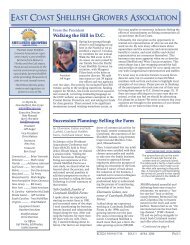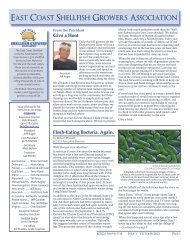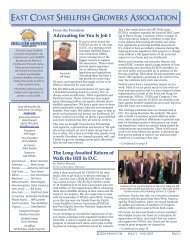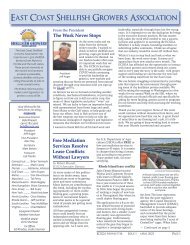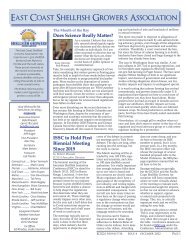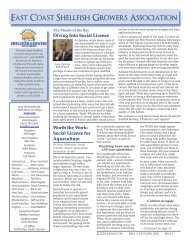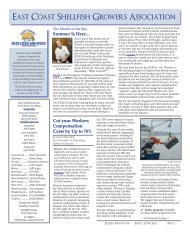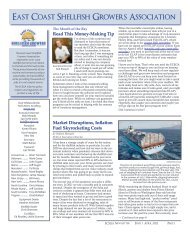East Coast Shellfish Growers Association August 2021 Newsletter
Read about the new disaster assistance for shellfish growers from the Farm Service Agency:ELAP; the death of Walt Canzonier; a win for South Carolina growers with help from allies; new biodegradable netting from Ketcham Supply; Prop 65 warnings; shellfish farm ecosystem services study.
Read about the new disaster assistance for shellfish growers from the Farm Service Agency:ELAP; the death of Walt Canzonier; a win for South Carolina growers with help from allies; new biodegradable netting from Ketcham Supply; Prop 65 warnings; shellfish farm ecosystem services study.
You also want an ePaper? Increase the reach of your titles
YUMPU automatically turns print PDFs into web optimized ePapers that Google loves.
A Win for the Good Guys
by Robert Rheault,
ECSGA Executive Director
Every now and then I come across a positive
story about a local permitting battle that I just
have to share. Recently I heard about a regulatory
challenge in the South Carolina legislature
that growers were able to defeat. This tale is
worth recounting because it illustrates the value
of state associations and the importance of
forging alliances.
Frank Roberts of Lady’s Island Oysters in
Beaufort, S.C., got into a battle with his state
senator. The two had sparred a few years ago
when the senator tried to block some new leases,
stating that, “We don’t need any more small
businesses in Charleston.” So when Frank supported
her opponent in last year’s election, the
spurned lawmaker decided to exact revenge by
passing a bill revoking shellfish growers’ rights
to harvest oysters in summer.
Until five years ago South Carolina (like
Georgia) had prohibited summer harvesting of
oysters to avoid Vibrio illnesses. But then Frank
and the South Carolina Growers Association
(SCGA) managed to get a bill passed allowing
the harvest of farmed oysters in summer, because
as any grower will tell you, summer sales
are a vital part of an oyster farm’s survival.
In the years since the bill was passed South
Carolina growers have proven that they can
safely harvest oysters by rapid chilling. Restaurants
loved the local product—a half-dozen
oyster bars have sprung up in Charleston alone.
With summer sales now comprising about 45
percent of Frank’s annual revenue, he understandably
went ballistic when
he got wind of the proposed bill
revoking summer harvest rights.
But rather than bring his Marine
sniper training to bear, he galvanized
the state growers association
into action. SCGA President Julie
Davis worked with Frank and the
other seven farms in the state to develop
an effective lobbying strategy,
but with such a small industry, they
realized they needed to enlist some
allies. Thankfully, they had been
working with the Farm Bureau for
years, and in South Carolina (as
in much of the country) the Farm
Bureau wields a lot of clout.
They also brought in a group of 16
restaurateurs from Hilton Head,
many of whom had built menus
and raw bars around the concept
of local, sustainable fresh oysters.
In addition to providing employment
for around 1,200 workers,
they were able to point to $72,000
in annual restaurant taxes tied to
oyster sales.
The restaurateurs quickly raised
about $28,000 by charging diners
a fee of $1 per oyster, which
was used by the SCGA to hire two lobbyists.
Mobilizing chefs in white jackets and towering
toques to roam the halls of the state house
proved to be an extremely effective tactic.
The SCGA also enlisted the support of the
Coastal Conservation Association (CCA), a
well-connected group of recreational anglers
who understood that shellfish-farming gear
makes great habitat for summer flounder, and
who were keen to see farms expand.
In the end, this powerful coalition of likeminded
oyster-farming supporters managed to
beat back anti-farming legislation that would
have crippled the fledgling oyster-aquaculture
industry in South Carolina.
After the bill failed to get traction, the leaders
of the South Carolina House and Senate asked
Julie Davis to work with their staffers to hammer
out a few unrelated issues in the aquaculture
regulations that needed fixing. Everyone
agreed that the procedures for issuing public
notices on proposed leases could use improvement,
and that some other points of contention
needed to be resolved. To their credit, the
legislators chose to work with industry to make
AQUAMESH®
MADE IN THE USA
riverdale.com
OYSTER HOUSE
Since summer harvesting of oysters was first allowed
in South Carolina five years ago, new restaurants
have sprung up in Charleston and chefs have built
menus around fresh, local oysters that are available
year-round. The threat of shutting down summer
harvests was met with resistance from growers and
restaurateurs alike.
sure the changes were done right. At one recent
meeting Julie pointed out that there was no reason
for the anti-aquaculture folks in the South
— Continued on page 7
ECSGA Newsletter Issue 3 August 2021 Page 3




